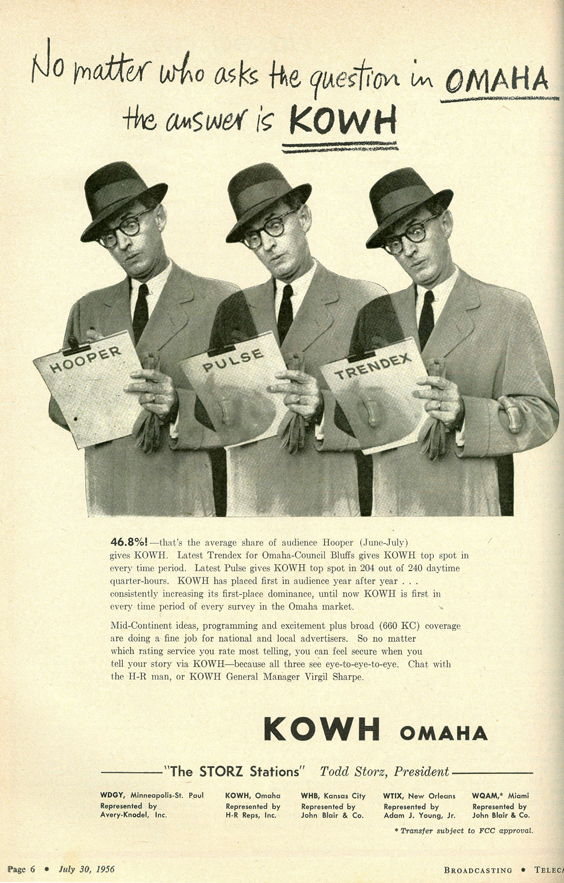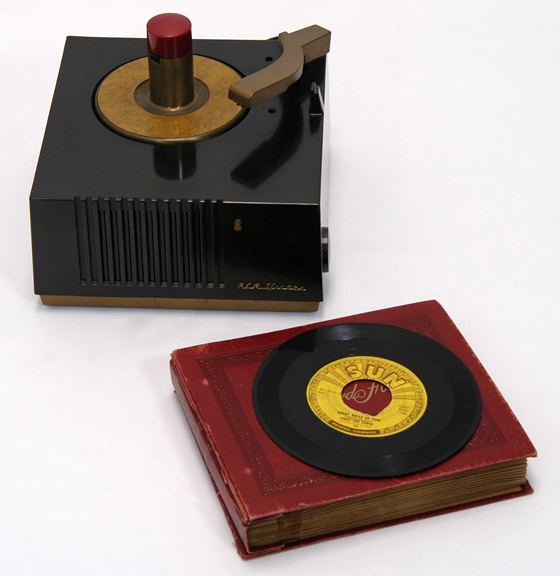Todd Storz, owner of Omaha’s KOWH, saw music as opportunity. He showed the world how to harness music and make it profitable in a world more interested in visual stimulation than audio. Largely because of his invention and business efficiency, American radio was shaped into a form that is still popular today: Top 40.
In the Spring 2012 issue of Nebraska History, Chris Rasmussen tells more about Storz’s career in his article “Vox Populi of Omaha: Todd Storz and the Top 40 Radio Format in American Culture.” Storz was born in 1925 in Omaha, to a wealthy family that could fund his early interest in ham radio and obsession with new technology. During his one year at the University of Nebraska, Storz experimented with radio by altering the broadcasting range of the University’s radio station. His dabbling was shut down by the Federal Communications Commission when it was discovered that the University of Nebraska station could be heard in Ohio. Cheeky towards authority and very intelligent, Storz’s personality would be reflected in his later radio stations.

Mid-Continent celebrates the KOWH’s dominance in the Omaha market, showing off its eye-popping ratings in the mid-1950s. Broadcasting/Telecasting, July 30, 1956.
For example, the give-aways that characterized Storz’s stations and those of his imitators were designed to make the station seem fun and young. The radio station promoted local treasure hunts and capers that repeatedly made newspaper headlines, which only encouraged Storz. Rasmussen describes the chaos that ensued when Storz’s Omaha station KOWH told listeners that there were six ten-dollar checks hidden in books in the Omaha Library. And when a KOWH city-wide treasure hunt was so popular that it caused a downtown traffic jam; “Storz was there, comically directing traffic from his car.”
The idea of Top 40 was fairly simple. Storz believed that if you captured the young audience, you could eventually capture the old. By only playing the top 40 most popular songs, Storz gave listeners only what they wanted. He then punctuated music with camaraderie-building events, making radio a “cool” thing to be a part of. Before, the music choice of a station depended on the personal taste of the disc jockeys. Now, Storz operated his business like a machine that ran only on local popular demand.
A record player from the 1940s – 1950s, built to play the new “45’s” such as a Jerry Lee Lewis’s 1957 hit, “Great Balls of Fire.” As a radio station owner, Todd Storz was among the early adopters of an all-records format. NSHS 9379-38(1) (below).
 Keeping up with technology also improved Storz’s success. Before WWII, the center of the home had been radio, now it was television. So rather than compete with television for live talent and center-stage in the home, Storz simply took anything and everything that television did not. By making radio almost purely music, his stations could be companions to listeners in the car, workplace, shop, etc. Rasmussen states: “Where the network conventional wisdom had been that listeners wanted to ‘be there,’ Storz knew that his listeners wanted radio to be with them. The shift in the musical experience was profound and paved the way for listening styles of subsequent decades.”
Keeping up with technology also improved Storz’s success. Before WWII, the center of the home had been radio, now it was television. So rather than compete with television for live talent and center-stage in the home, Storz simply took anything and everything that television did not. By making radio almost purely music, his stations could be companions to listeners in the car, workplace, shop, etc. Rasmussen states: “Where the network conventional wisdom had been that listeners wanted to ‘be there,’ Storz knew that his listeners wanted radio to be with them. The shift in the musical experience was profound and paved the way for listening styles of subsequent decades.”
Although Storz eventually sold Omaha’s KOWH to pursue his other stations, the radio revolution that Storz began with KOWH was already sweeping the nation. Thousands of radio station owners had realized the enormous potential for a new kind of radio. When television became popular, social monitors predicted that radio would die. However, because of the invention of Storz and others like him, radio would be reborn.
– Joy Carey, Editorial Assistant



